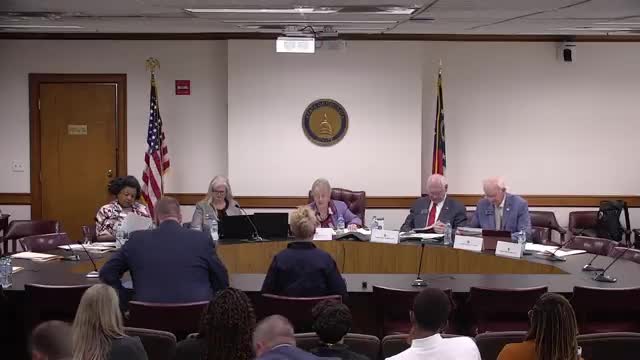GICA Highlights Georgia Colleges' Role in Affordable Education and FAFSA Completion Rates
September 18, 2025 | Senate Study Committees, SENATE, Committees, Legislative, Georgia
This article was created by AI summarizing key points discussed. AI makes mistakes, so for full details and context, please refer to the video of the full meeting. Please report any errors so we can fix them. Report an error »

The recent Senate Study Committee on Higher Education Affordability in Georgia highlighted critical discussions surrounding college affordability, emphasizing the need for improved access to financial aid for students across the state. The meeting, held on September 18, 2025, featured insights from various educational leaders, including representatives from the Georgia Independent College Association (GICA).
A key focus of the meeting was the significant amount of unclaimed federal Pell Grant funding in Georgia, estimated at over $136 million annually. This funding is crucial for low-income students, yet many do not complete the Free Application for Federal Student Aid (FAFSA), which is necessary to access these grants. The committee discussed strategies to improve FAFSA completion rates, suggesting a shift from an opt-in to an opt-out model, which could automatically enroll students unless they decline.
The discussion also touched on the role of GICA colleges, which serve a diverse student population and provide a unique educational experience rooted in Christian values. These institutions are committed to making higher education accessible and affordable, with many students receiving substantial institutional aid. On average, GICA colleges offer over $22,000 in aid to first-time, full-time students, significantly reducing the net cost of attendance.
Despite concerns about rising tuition costs, the meeting revealed that the average net tuition at private nonprofit colleges has actually decreased over the past decade. This trend contradicts the common narrative of skyrocketing college expenses. Additionally, the average student debt for GICA graduates is only slightly higher than that of their peers from public universities, with many students graduating without any federal loans.
The committee's discussions underscored the importance of addressing misconceptions about college costs and the financial aid landscape. As the state continues to explore ways to enhance affordability, the insights shared during this meeting will be vital in shaping future policies aimed at supporting Georgia's students and ensuring that higher education remains within reach for all.
A key focus of the meeting was the significant amount of unclaimed federal Pell Grant funding in Georgia, estimated at over $136 million annually. This funding is crucial for low-income students, yet many do not complete the Free Application for Federal Student Aid (FAFSA), which is necessary to access these grants. The committee discussed strategies to improve FAFSA completion rates, suggesting a shift from an opt-in to an opt-out model, which could automatically enroll students unless they decline.
The discussion also touched on the role of GICA colleges, which serve a diverse student population and provide a unique educational experience rooted in Christian values. These institutions are committed to making higher education accessible and affordable, with many students receiving substantial institutional aid. On average, GICA colleges offer over $22,000 in aid to first-time, full-time students, significantly reducing the net cost of attendance.
Despite concerns about rising tuition costs, the meeting revealed that the average net tuition at private nonprofit colleges has actually decreased over the past decade. This trend contradicts the common narrative of skyrocketing college expenses. Additionally, the average student debt for GICA graduates is only slightly higher than that of their peers from public universities, with many students graduating without any federal loans.
The committee's discussions underscored the importance of addressing misconceptions about college costs and the financial aid landscape. As the state continues to explore ways to enhance affordability, the insights shared during this meeting will be vital in shaping future policies aimed at supporting Georgia's students and ensuring that higher education remains within reach for all.
View full meeting
This article is based on a recent meeting—watch the full video and explore the complete transcript for deeper insights into the discussion.
View full meeting
